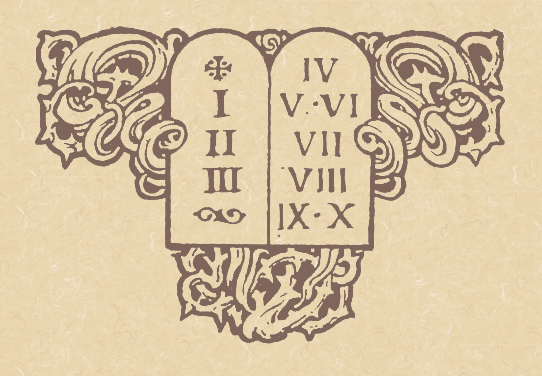Hush, for Today Is Holy, and You Must Not Be Saddened.
In the United States:
The 26th Thursday of Ordinary Time; or, the Memorial of Blessed Francis Xavier Seelos.*
Lessons from the primary feria, according to the ordinary form of the Roman Rite:
• Nehemiah 8: 1-12.
• Psalm 19: 8-11.
• Luke 10: 1-12.
If a Mass for the memorial is taken, lessons from the feria as above, or any lessons from the common of Pastors or the common of Holy Men & Women for Religious. |
|
Outside the United States:
The 26th Thursday of Ordinary Time.
Lessons from the feria as above.
|
The Seventeenth Thursday after Pentecost; and, the Commemoration of Saint Placid & His Companions, Martyrs.**
Lessons from the dominica,*** according to the extraordinary form of the Roman Rite:
• Ephesians 4: 1-6.
• Psalm 32: 12, 6.
• Matthew 22: 34-46.
|
If a Mass for the commemoration is taken, lessons from the common "Salus autem…" of Many Martyrs:
• Hebrews 10: 32-38.
• Psalm 33: 18-19.
• Luke 12: 1-8.
|
The Seventeenth Thursday after Pentecost; and, the Feast of the Holy Martyr Charitina.†
Lessons from the pentecostarion, according to the Ruthenian recension of the Byzantine Rite:
• Ephesians 5: 33—6: 9
• Luke 7: 17-30.
FatherVenditti.com
|
 1:20 PM 10/5/2017 — It was exactly one week ago that we had read from the Book of Haggai, and the day before that from Ezra. The background to these events is important: the Jews had pretty much lost their faith during the years spent in captivity in Babylon, and when they were set free by King Cyrus of Persia and returned to Jerusalem, they found the Temple in ruins. Wrestling with the question of rebuilding the Temple, Ezra alone knew that there would be no point to doing it if the people had no faith to practice there, so he and all these minor prophets whose books we are reading from are all calling the people back to their faith. 1:20 PM 10/5/2017 — It was exactly one week ago that we had read from the Book of Haggai, and the day before that from Ezra. The background to these events is important: the Jews had pretty much lost their faith during the years spent in captivity in Babylon, and when they were set free by King Cyrus of Persia and returned to Jerusalem, they found the Temple in ruins. Wrestling with the question of rebuilding the Temple, Ezra alone knew that there would be no point to doing it if the people had no faith to practice there, so he and all these minor prophets whose books we are reading from are all calling the people back to their faith.
Today’s first lesson is the climax, more or less, as Ezra reads to the people from the Law of Moses which they had so long ago forgotten. Hearing it, they are reminded of everything God had done for them over the centuries, and are filled with remorse for their sins and begin to weep, but Ezra and Nehemiah exhort them to rejoice and celebrate instead, because they have rediscovered that which gave them their identity as a people.
“The Law of the Lord is perfect, refreshing the soul…” (Psalm 19: 8 RM3) we heard in today’s Psalm, to which we all responded, “The precepts of the Lord give joy to the heart.”
We are, of course, overwhelmed with sadness and grief and emotion over the tragic events that have been thrust before our eyes and ears over the past few days, so much so that we may find it even difficult to comprehend what’s going on in the world around us. There are, of course, many stories of heroism and bravery and self-sacrifice in which we can take solace, but they don’t remove the pain we feel for so many who have lost their lives for no reason. You might find the comparison strained, but we are very much like the Jews newly released from captivity: confused, aimless, feeling without purpose or direction, not knowing what to do, where they’re going or even where they’ve been.
But just as the Jews of Ezra’s time found new hope in a faith long ago forgotten, so can we, and offer that faith and that hope to others along the way. That, perhaps, is the silver lining to all great tragedies: that they cause people to raise their eyes up from the mundane and temporary things of this world to gaze upon heavenly realities. It helps us to put the personal crosses we all carry into perspective, and renews our appreciation for the things that truly matter.
Let us ask our Blessed Lord today to shower down His graces upon those who suffer, to give comfort to the families who have lost loved ones, and take into our hearts the words spoken by the Levites: “Hush, for today is holy, and you must not be saddened” (Neh. 8: 11 RM3).

* Born in Germany, Francis Xavier Seelos entered the Congregation of the Most Holy Redeemer and was sent to North America. Ordained in 1844, he began his pastoral ministry in Pittsburgh as an assistant pastor of his friend, St. John Neumann, and also served as Master of Novices for his congregation. He them became a full-time itinerant missionary, preaching in both English and German all over the country. He died in New Orleans on October 4th, 1867, and was beatified by Pope St. John Paul II on April 9th, 2000.
** St. Placid was four years old when his father, Tertullus, entrusted him to the care of St. Benedict, who eventually sent him to establish a monastery in Sicily. He was murdered with his monks out of hatred for the faith by heathen pirates in the year 541.
*** In the extraordinary form, on ferias outside privileged seasons, the lessons come from the previous Sunday.
† According to the menaion of the Greek Church, Charitina suffered various torments as a witness of Christ and died a martyr in the days of Emperor Diocletian.
|

